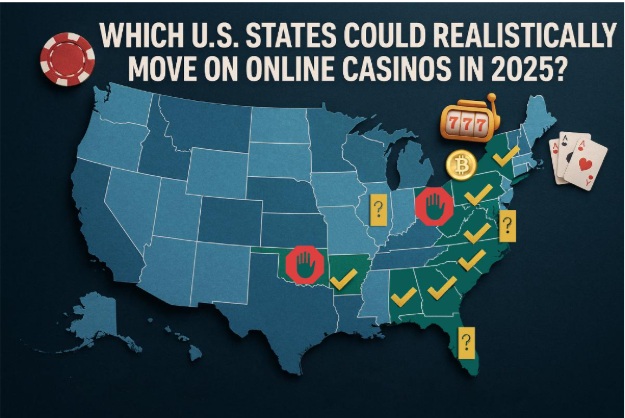
In just a few years, the rise of sports betting has changed the way people play games in the U.S., but online casinos are still the slow, careful cousin. As of late 2025, only seven states fully regulate iGaming. These are New Jersey, Delaware, Pennsylvania, Michigan, West Virginia, Connecticut, and Rhode Island. In contrast, more than thirty states allow sports betting.
Still, the stress is rising. Commercial operators pay billions of dollars every year, which shows how appealing an extra gaming tax can be to legislatures that are having trouble making ends meet.
But lawmakers are becoming more and more aware that billions of dollars are still going to offshore sites that are not regulated. At the moment, this is especially true in states that have developed land-based markets but no online casino channels.
That dynamic sets the stage for a handful of serious (and a few long-shot) contenders in 2025.
Arkansas: A Short, Sharp iGaming Debate – Then a Pause
Voters approved commercial casinos via a 2018 constitutional amendment, authorizing the Arkansas Racing Commission to license and regulate casino gaming at four locations. This includes Oaklawn Racing Casino Resort and Southland in West Memphis. Since then, the state has added sports betting, making a fairly simple but up-to-date gaming system.
The government took things one step further in March 2025. HB1861 and SB524 were companion bills that tried to make an "Interactive Gaming Act" that would explicitly expand interactive gaming to include online casino play run by existing casino licensees.
The bills limited each establishment to a single branded platform and linked interactive games to GLI-19 technical standards. This showed a strict, regulation-first approach.
But for now, those plans are on ice. Concerns about consumer taxes and the legality of online sweepstakes operators led to the withdrawal of HB1861 and the suggestion that it be studied more briefly in April. Several trade publications called the push for 2025 "over" for this legislative cycle.
That puts operators and suppliers in an interesting spot. There are now legalized retail casinos and sports betting, and policymakers have written up and partially debated a full framework for interactive gaming. Professionals who keep an eye on Arkansas online casinos have already had to change their focus from "if Arkansas ever goes online" to "how quickly a shelved framework could be brought back to life once political and tax issues are resolved." The chances of a live market in 2025 are now low, but Arkansas has clearly moved from "no activity" to "medium-term contender" thanks to online options.
Maryland: HB 17 Builds a Full-Scale Internet Gaming Blueprint
If there is a textbook example of how to expand from sports betting into iGaming, Maryland’s House Bill 17 comes close.
Filed by Delegate Vanessa Atterbeary, HB17 would authorize the State Lottery and Gaming Control Commission to license and regulate “Internet gaming,” effectively adding online slots and table games to a market that already supports casinos and statewide mobile sports betting. The bill envisages online casino licenses tethered to existing operators, with participation limited to registered players aged 21 and over and subject to a referendum.
From an operator perspective, Maryland ticks several attractive boxes:
- Established land-based and sports betting ecosystem.
- A central regulator with significant experience.
- A proposal that explicitly allows for multi-state internet gaming agreements, opening the door to shared poker liquidity down the line.
The challenge is not with the structure, but with timing and politics. When HB17 comes out, lawmakers know exactly how much tax revenue neighboring states are getting from iGaming. For now, the regulated markets bring in about $15 billion in gaming tax revenue a year, even though this number excludes sports betting across the country.
Virginia: Testing Appetite Beyond Sports Betting
Next door, Virginia is taking a structurally similar step with its own online casino proposal.
Pre-filed by Senator Mamie Locke, the Senate Bill 827 would legalize online gaming at a 15% tax rate on adjusted gross revenue. This ialigns with the model legislation promoted by the National Council of Legislators from Gaming States, which recommends 15–25% tax bands and robust consumer safeguards.
SB827 would allow each retail casino to partner with up to three online brands. This would effectively create a multi-skin environment familiar from New Jersey and Michigan. With sports betting already live and an expanding casino footprint, the infrastructure is in place for a rapid iGaming ramp-up.
The headwinds are more political than technical. Virginia’s 2025 session window is narrow, and legislators are still digesting early data from retail and sports wagering. Overall, Virginia joins Maryland as a top-tier “true watchlist” state this year.
Florida: Tribal Compact First, iGaming Later
The Seminole Tribe’s exclusive Hard Rock Bet sports betting footprint is now firmly back online after years of litigation. This gave Florida a single-operator but fully statewide mobile wagering model under a 30-year compact.
Multiple reports in 2024 and 2025 suggest Seminole leaders are exploring an expansion of that framework to include online casino games, with some analysts speculating that iGaming discussions could start as early as 2025.
However, any such move faces two structural hurdles. One is a 2018 constitutional amendment that requires any expansion of commercial casino gaming to be approved via statewide referendum. Another hurdle are active legislative efforts (such as HB953 and SB1404) aimed at centralizing online gambling under the Seminole Tribe and curbing independent sweepstakes or casino-style platforms.
From an industry standpoint, Florida’s sheer scale makes it the ultimate prize. Any Seminole-led iGaming launch would likely set benchmarks for compacts across the Sun Belt. But the same legal and constitutional complexity that slowed sports betting makes a full online casino roll-out in 2025 highly ambitious.
Illinois: A Mature Market Playing the Long Game
Illinois already ticks most of the boxes associated with successful iGaming states. It has a large population, a developed land-based casino sector, retail and mobile sports betting, and an established regulatory apparatus.
What it lacks is legislative closure. The General Assembly has seen several iterations of Internet Gaming Act proposals, notably HB2239 and HB2320. These would have authorized online casinos at tax rates between 12% and 15%, with up to three skins per licensee.
When new companion bills were introduced in early 2025, Illinois became the latest state that could become an expansion state. But this time the tax rate is 25% and the structure has more than one skin.
Sponsors have been honest about the fact that passage is not likely to happen soon. They see their current efforts as a "long game" meant to make the idea of iGaming more common among coworkers and other stakeholders.
That signaling is still important for operators who already do business in the state. It means Illinois is on the same "next-wave" list as Maryland and Virginia, even though the political timeline is longer.



















